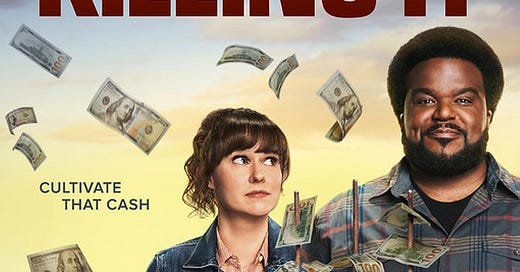Broadly speaking, satires of American capitalism come in two flavors: The Rich Are Different (Because They’re More Venal) and The Poor Can’t Catch a Break (Because the Deck Is Stacked). In Category 1, see “Succession.” In Category 2, see “Killing It,” whose second season debuted last month on Peacock. I’d missed the first season, but as soon as I read James Poniewozik’s review of Season 2 in the New York Times (gift link) I started a steady binge.
“Killing It” stars Craig Robinson (who had memorable roles in “The Office” and “Brooklyn Nine-Nine”) as Craig Foster, a bank security guard in Miami whose modest American dream involves starting a saw palmetto farm in the Everglades to grow berries used in male-health supplements. Fate sends him an Uber driver, Jillian Glopp (Claudia O’Doherty), a sunny, daffy Australian immigrant threatened with deportation and so broke she’s living in the advertising billboard she tows behind her beat-up car. Jillian gets by with gig work: ”I Uber, I Lyft, I TaskRabbit, I get paid by creeps online to watch me eat bananas.” She also earns bounties for killing the Burmese pythons that have invaded the Florida swamps. (True story!) When Craig’s land deal falls through, Jillian persuades him to enter a python-hunt contest with her. The grand prize, $20,000, is exactly what Craig needs to start his dream farm.
So Season 1 is all about the snakes. In Season 2, Craig and Jillian have their farm, but only barely. Now they must deal with other predators: a manic real estate entrepreneur, his preternaturally self-assured 12-year-old daughter, a swampland crime family, and a one-eyed wannabe social-media influencer. There’s also a rogue shark and some giant African land snails (another true story!). It’s funny, biting, profane, often warm, and occasionally violent. It’s also an acerbic reflection of our brand-obsessed culture.
It’s impossible not to notice the insistent presence of brands, real and invented, in “Killing It.” Uber, for example, is almost a character in the first season. One Season 1 episode revolves around a TaskRabbit gig of Jillian’s that goes hilariously wrong. Another episode centers on Jillian’s beloved new Kia sedan, which she names “Mallory” and which she defends with surprising ferocity from some scamming car thieves. And that business-savvy 12-year-old girl? Her first name is Prada, as in the Italian fashion brand. (Her weirdly grown-up wardrobe looks more like Chanel, though.)
Blended seamlessly with the real brand names (product placement or sneaky namechecking? I couldn’t tell) are close-to-real made-up brands. One Season 1 episode takes Craig and Jillian to a motivational conference for entrepreneurs called “Dominine.” Why Domi-nine? Because it goes beyond “domin-ate.” A drive-through fast-food restaurant in Season 2 is called “Lil’ Piggies.” (Customers are greeted with “What looks good in the trough today?”) In a loopy Season 2 episode about a cottage industry of Pitbull impersonators, the (real) singer’s signature “Dale” imperative—”go for it!”—becomes a (fake) beverage brand name. A down-market, on-hiatus strip joint is called “Carpets”: because the carpets match the drapes? When the manic businessman takes over Craig and Jillian’s business, he rebrands their product: “Saw palmetto berries” has “limp-dick vibes,” he decides, so he mixes in shark cartilage and changes the name to “Predator Power.” (Slogan: “Get Predatory.”) “Predator as in sexual predator?” asks a dubious Jillian. “Controversy sells,” she’s told.
It isn’t just the brand names: an obsession with branding permeates the dialogue and the characters’ motives. Becoming an influencer, growing a personal brand, and turning every experience into “content” are pervasive themes. One character fakes his own death and turns the “funeral” into a YouTube video. We think in brand language now: In a throwaway line, Craig dismisses San Diego as “Diet Miami.” A low-level employee of “Green Bounty Organics” (“I bag my lunch and clock in a 14-hour workday like any regular Joe”) rattles off corporate jargon: “circle back,” “boil the ocean,” “the smell test.” When Craig finally meets his idol, the successful motivational speaker Rita Gaines (bonus points for that surname!), she smilingly brushes him off, telling him how much she admires his struggles. “Never stop struggling!” she trills.
The struggle is, in the end, very real, and viewers may be divided on how it plays out for Craig and Jillian. As Poniewozik writes in his review, “You’re either offing snakes or selling snake oil.” Either way, “killing it”—whether it’s the act of murder or the metaphor for success—is the name of the game.




